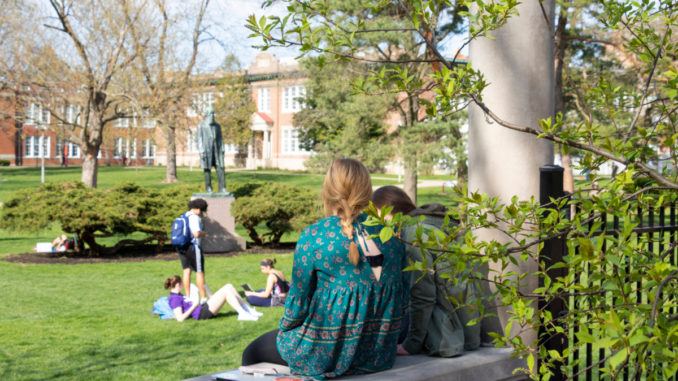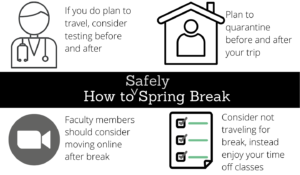
On Friday, March 5, many Truman students will be on their way home for the long-awaited Spring Break. In line with the Centers for Disease Control and Prevention’s calls for staying home over break, school officials continue to urge students to take health and safety precautions if they decide to travel.
Sara Seifert, director of the Department of Public Safety, is asking students to follow best practices by not attending large social gatherings and protecting their belongings while they are away from campus.
“Just be aware that motor vehicle thefts are on the uptick and the pandemic is causing a lot of people hardships and money issues,” Seifert said.
DPS has published a series of directives and advisories related to keeping individual belongings safe while students and faculty are away from campus. Most practices are common sense, Seifert said, but an extra level of precaution this year could be useful considering the current economic recession.
Seifert said she recommends taking a picture of the serial numbers on electronic devices as a solid last line of defense for students forced to leave personal or valuable items in Kirksville. Students should also consider having trusted neighbors check on their place of residence once or twice a day, Seifert said.
Any practice that involves the flow of people in and out of a residence will reduce the risk of crime, Seifert said.
While there are plenty of challenges facing students on a safety front, taking precautions to slow the spread of COVID-19 over break remains a top priority for Truman’s health officials.
Brenda Higgins, associate vice president for student health and wellness, said although the last two weeks have seen a decrease in reported cases, the possible cause for the decrease could be from lower testing rates.
Higgins said college students usually only have mild symptoms that could be confused for a common cold or allergies. Such a suspicion arises from college students’ tendency to experience less severe symptoms that can imitate a common cold or allergies.
“We want to ask students to be as responsible as they possibly can, to think about others as well as themselves,” Higgins said.
Spring Break brings complex challenges to preventing the spread of COVID-19. If students decide to travel against CDC recommendations, Higgins said she advises students to create quarantine arrangements one to two weeks prior to traveling and to get tested upon or before their return to campus.
Higgins said one of the concerns weighing most heavily on faculty is that students are rapidly fatiguing and beginning to stray away from the University’s recommendations.
Concerning Spring Break, Seifert re-emphasized the no travel advisory. Despite this, she said she also recognizes the need for a mental health break.
“Students and faculty are so tired of this, but the more we can adhere to those guidelines, the quicker it will be over,” Higgins said.
Higgins said Truman students and faculty, with the exception of isolated incidents, have dealt with the regulations and mask-wearing guidelines very well.
Higgins also said it’s too early to shift behavior into a more relaxed pre-coronavirus mindset.
“I think telling students ‘Don’t do this’ and ‘Don’t do that’ is not the way to go,” Higgins said. “We also need to recognize what a great job most students are doing.”

